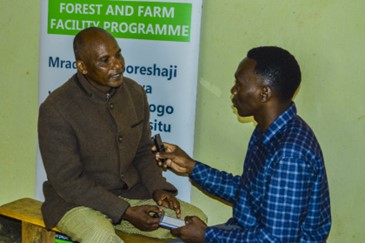In collaboration with YenKasa Africa and MVIWAMA, Habari Njema Radio 87.5 FM produced a radio episode in Swahili titled “Marketing Efficiency and Value Chain of Garlic.” This was produced under the radio programme “Kilimo Bora, Maisha Bora” (Good Farming, Better Lives), which is dedicated to promoting sustainable agriculture and improving farmer livelihoods. The program explores the garlic value chain in the Mbulu District of Tanzania, focusing on the efforts of local farmers to add value to garlic and access competitive markets.
The Importance of Value Addition in Garlic Production
Local farmers discussed several strategies to add value to garlic production, enhancing marketability and profitability. For instance, Marcela Desideri Mao from the Diomat Irrigation Scheme has established a processing plant where garlic is peeled, sliced, dried, and ground into paste, oil or powder. These processed forms of garlic attract higher market prices and cater to diverse consumer needs. Other farmers, like Kastuli Paulo from Dongobesh, add further value by blending garlic with ginger and honey, creating products that appeal to health-conscious buyers. Proper storage techniques, such as using warehouses, can help farmers sell their garlic at optimal prices.
Market Opportunities and Demand
According to Kimondee Lazier, the Acting Officer for Industry, Trade, and Investment in Mbulu District, garlic has strong local and international demand. Recognized for its quality, Mbulu garlic is largely cultivated using organic fertilizers, giving it a distinct aroma, pungency, and colour. Besides cooking, garlic is widely used in natural medicines and other industrial applications, creating robust market opportunities. The ongoing support and promotion of such quality-oriented practices can further enhance the competitiveness of Mbulu’s garlic in broader markets.
Challenges and Collective Solutions
While the demand for Mbulu’s high-quality garlic is significant, farmers face several challenges, primarily unreliable market access and price fluctuations. Rejina Paulo from Tumati highlighted that a reliable market and price stability are vital for farmers’ thrive. Many have encountered difficulties with brokers who offer low prices, hindering potential profits. The Warehouse Receipt System has been introduced to address these challenges, allowing farmers to store garlic collectively and sell it when market prices are favourable. Sijaki Magoti, the Cooperative Officer for Mbulu District, elaborates on how this system stabilises income and ensures quality control, which is critical for maintaining a good reputation and meeting export standards.
Benefits of the Warehouse Receipt System
The Warehouse Receipt System offers multiple benefits:
- Quality Assurance: Garlic stored in the warehouse undergoes inspection, ensuring that only high-quality products reach the market.
- Collective Bargaining Power: Farmers can attract more buyers and secure better prices by pooling their produce.
- Access to New Markets: This system helps farmers meet the demand beyond the local level, potentially reaching regional and international buyers.
Conclusion
The garlic value chain in Mbulu District exemplifies how agricultural practices can evolve through collective action and value addition, improving market efficiency and farmer resilience. MVIWAMA and local stakeholders’ efforts continue to drive sustainable and profitable farming in the Manyara Region, offering a replicable model for other agricultural communities.
Listen to the Radio Programme (Language: Swahili)
Access all Tanzania’s Productions here:
You can access all other radio productions here:

